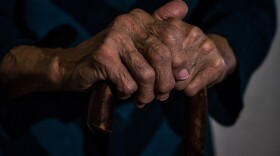Society is often telling us to act young, as if being old is a bad thing. But two Austin women say it's like any other time of life and want to talk about aging honestly.
Through their Instagram account Blue Hour Dames, illustrator Marian Henley and writer Ruth Pennebaker discuss the real joys, sorrows and individuality of aging.
They identify themselves as “two friends talking/laughing/wailing about age ever since they got old.” That of course begs the question: What is old?
Chronologically speaking, Henley says she is in her 60s; Pennebaker says she is 73.
But beyond the numbers, Henley and Pennebaker agree "old" sort of defies definition.
"I don't know what ‘old’ is," Pennebaker says. "But I know we avoid saying ‘old’ as if it’s the worst thing in the world."
In reality, Henley says she believes aging comes with what she calls "the beauty part" — perspective.
"I just feel like my heart has grown so much bigger," she says.
Listen to the interview above or read the transcript below to hear more about the Blue Hour Dames — including how they came up with their name.
This transcript has been edited lightly for clarity.
KUT: You identify in your Instagram account as “two friends talking/laughing/wailing about age ever since they got old.” How do you define “old”?
Ruth Pennebaker: I don't know what "old" is, but I know we avoid saying "old" as if it’s the worst thing in the world. You want to act young — always — as if being young were the best thing in the world, and I don't really think that's true. I'm trying to rehabilitate the word "old." It's not a bad thing. It's a wonderful thing to live to be older.
Marian Henley: I agree. I'm not sure I could define what old is either. I mean, it's such a progressive concept. When you're 10, you think 18 is old, etc., etc., etc., down the line. And I know maybe I feel kind of rickety in my 60s, but when I'm in my 80s, I'll look back on my 60s and think "the pink of youth."
Why do you think it is so hard to talk about aging and even to say ages or to talk about aging and growing old? Why is it so hard?
Henley: It's death. I mean, aging signifies mortality. When it becomes visible, I think it signifies death. I think it's that simple.
Pennebaker: I've really gotten kind of obnoxious, I think. I remember when I worked for a newspaper as a reporter, and I always dreaded asking people how old they are — as if it were the most impolite thing in the world. But now, at this point in life, I find myself asking people, "By the way, how old are you?" Because I want to know part of who they are. Where are they in their lives? It's suddenly important. What music do they recall? What great events have gone on in their lifetime?
I don't know if everybody necessarily knows what "blue hour" refers to. Can you talk a little bit about the name ‘Blue Hour Dames?’
Henley: Ruth came up with the name. I think Ruth first became enamored of the word "dame" for an older woman, and it connotes dignity. I think of Dame Judi Dench and all that. Dame Helen Mirren, all these fabulous dames. And I think of Humphrey Bogart with the dames. It has so many wonderful associations.
Pennebaker: The blue hour is when the sun has gone down, but there is still light. Clearly, it's a metaphor for time perhaps running a bit short and the shadows growing longer, but there is still a glow to it.
Can you all talk about what you hope to do with your Instagram?
Pennebaker: I think the idea is there are so many sources these days saying, "age this way, age that way." And I hear someone telling me how to age and my immediate reaction is, "Shut up." I'll age the best way I can. Don't tell me how to age. Don't tell me it's the most wonderful time of life or the worst time of life.
In so many ways, it's like any other time of life. I think most stages of life are hard, and aging is like that. But I want to talk about it as honestly as I can.
What would you say is the most honest, blunt thing about aging that each of you would want people to know?
Henley: If I may be blunt. I love being in my 60s. I mean, there are losses and deaths. That reality of mortality is more and more in your face. You'd have to be a self-hypnotist to deny it. And so for me, that's the hardest part is dealing with loss.
But the beauty part of it is the perspective. I just feel like my heart has grown so much bigger. My parents are both gone. And I wish I could gather them both in my arms and say, "I'm so sorry. I just didn't understand what you were going through." All the losses that they took with such grace. They both lived to ripe old ages, and they saw so many losses. And my heart just grows huge thinking about that and hoping that I can be as graceful as they were.
Pennebaker: Marian is right about your heart growing with age and your perspective growing. I think that's true. I also think this time of life breaks your heart because there is loss and every time there is a loss you know there will be more. But I would say also I don't fear death as much as the idea of losing control at some point.




